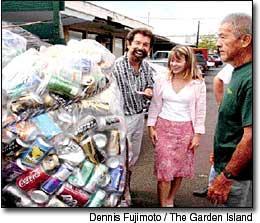LIHU‘E – When Harry Beppu found out he had won the recycling contest that ended a few days ago, he was surprised, and when he went to KQNG Radio to claim his prize of $1,000 in Radisson bucks, he didn’t
LIHU‘E – When Harry Beppu found out he had won the recycling contest that ended a few days ago, he was surprised, and when he went to KQNG Radio to claim his prize of $1,000 in Radisson bucks, he didn’t turn it down.
“My stepson is coming in from Honolulu this weekend, and I’m sure that’s a place he would like to go,” Beppu, 73, said as he accepted his prize from KQNG’s Ron Wiley, Mark Valentine, and county recycling coordinator Alison Fraley.
Wiley said when he was at the Radisson recently, “they all said ‘Harry going win this contest, easy.”
But, when Beppu started recycling over 10 years ago, making money, or winning prizes was the farthest thing from his mind. What mattered was keeping the land clean.
Beppu, who retired from the Federal government and the National Guard, said that he started recycling back in 1994 after seeing all the cans and bottles that people used to throw alongside the roads, “especially between Kekaha and Mana.”
“I used to pick up lots of cans there,” Beppu said. “Then, one day, I started to put ‘recycling’ barrels along the road.”
Beppu said people put all kinds of rubbish in them, but it didn’t matter because it was off the road. “I didn’t care,” he said. “the main thing is that it didn’t litter the road.”
From that point, Beppu became hooked on recycling, establishing recycling barrels, discarded 55-gallon barrels, at Salt Pond, Waimea Park, Kekaha Field, the Kekaha boat harbor, and the Kekaha Neighborhood Center.
“It was a lot of work,” Beppu said. “But, it’s okay since it’s that much less that goes into the landfill, and it doesn’t litter the roads.”
Beppu maintains the barrels on a weekly basis, collecting, sorting, and getting the recyclables ready for the trip into town.
Additionally, as the cruise boats started utilizing Port Allen, Beppu started collecting from them as well.
“He’s up by 5 in the morning,” his daughter Reni Pereira explains. “And, he doesn’t get home until 7:30, or 8 at night. He has literally made recycling his career.”
“I turn in a lot of plastics,” Beppu said. “Before the ‘Hi 5′ program, I used to bring them to the recycling bin at (‘Ele‘ele) Big Save. Maybe they should Hi 5 the plastics (shopping bags), too”
“I used to spend a lot of money on gas,” Beppu explained. “Over $100 a month. That was my biggest problem.”
Another thing the quiet, modest gentleman pointed out was that “when I started collecting, a lot of the cans -were tin. Now, they’re aluminum. And, there’re a lot more bottles.”
“And now, (with the Hi 5) I can make some money,” he smiled as he fingered his wad of Radisson bucks that would supplement redemption fees from a trip to the Reynolds recycling facility in Nawiliwili.
His pickup overflowing with bagged aluminum cans and bottles, Beppu pointed out, “These cans aren’t Hi 5. They’re just the ones I pick up. But, the bottles, most of them are Hi 5.”
It is this kind of planning that makes the trips into Lihu‘e pay off for Beppu.
“I have another load like this at home,” he said. “Those are the Hi 5 cans. Maybe I can bring that in next week.”
Since the redemption program started, Beppu has already visited the Reynolds facility in Nawiliwili regularly, and on one occasion when the machinery was down, even went up the hill to the Garden Island Disposal office. He is also a frequent visitor to the Kaua‘i Resource Center on Ahukini Road.
Kurt Comilang, the Reynolds Kaua‘i District Manager, was quick to recognize the familiar pickup and elderly gentlemen.
Comilang said the regularity of Beppu’s visits, and the quantity of items he brings in had him establish a routine with Beppu where he calls in advance before coming in. And, when Comilang discovered that Beppu had just won the recycling contest, he said, “Yep. He’s the winner! We all agree on that.”
As Beppu handed off bag after bag to the Reynolds crew, he noted, “It’s a lot of work, this recycling thing. But, it’s okay.”
Dennis Fujimoto, photographer and staff writer, can be reached at 245-3681 (ext. 253) and dfujimoto@pulitzer.net


